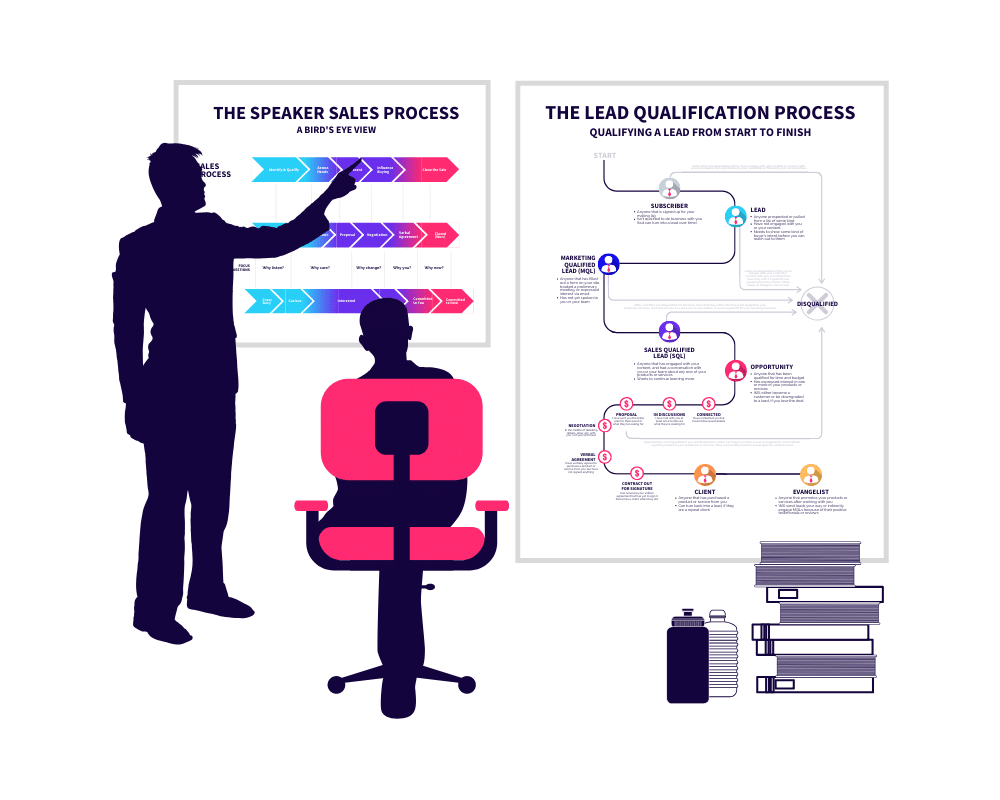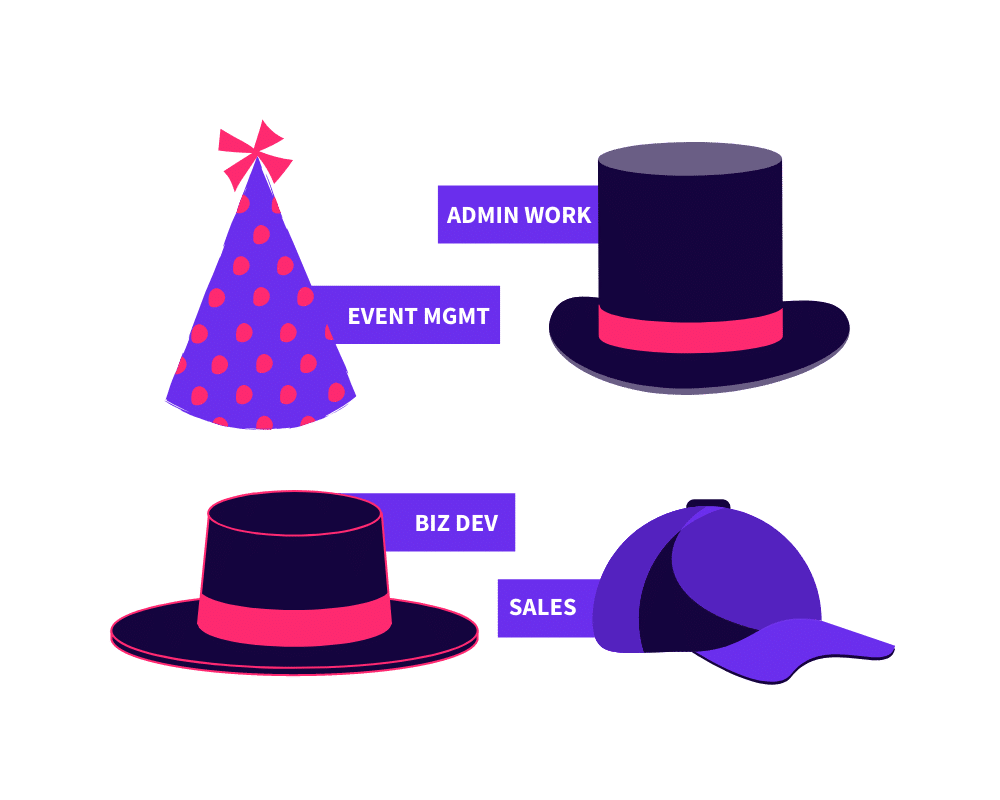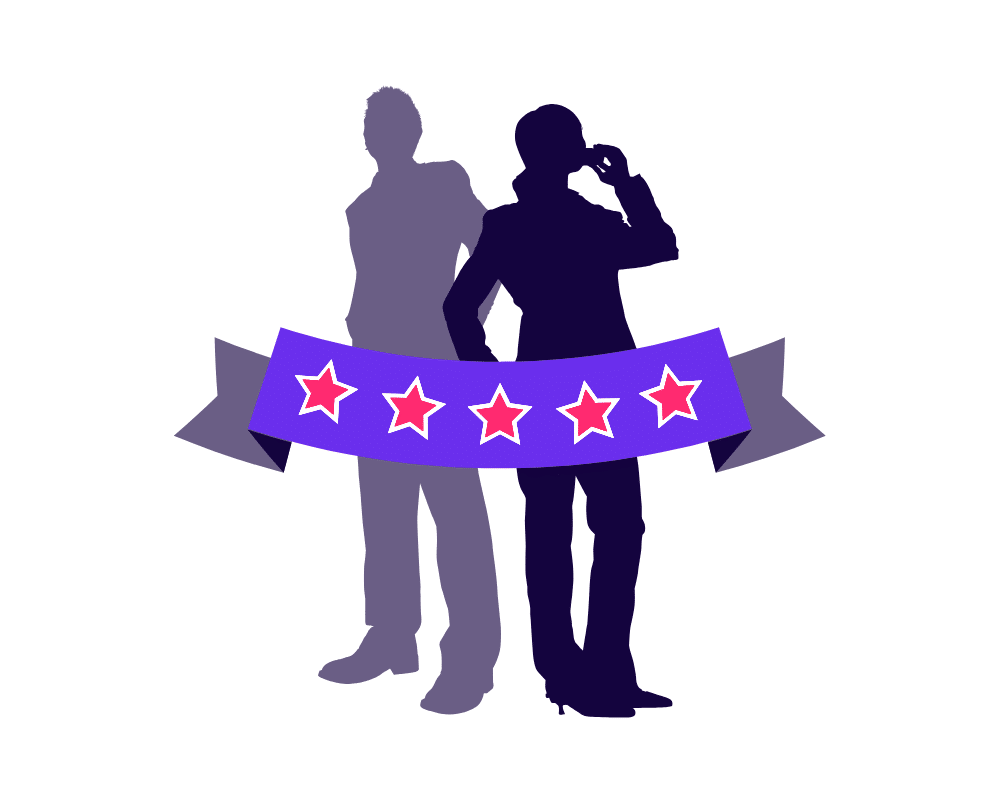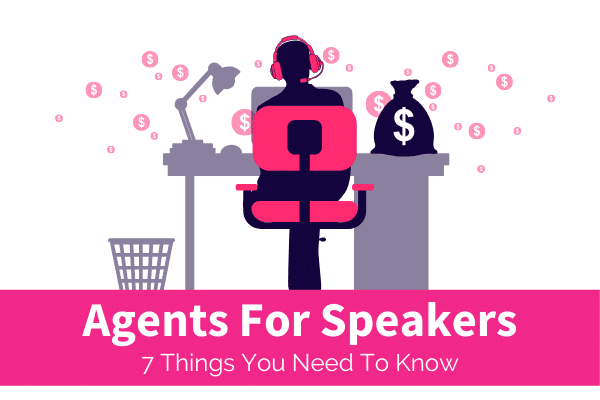Whether you’re brand new to the speaking industry or you’re a legend in it, you’ve probably thought more than once, “How can I offload some of this work?” After all, between selling, travel, and day to day tasks, your responsibilities as a speaking business owner can be overwhelming. There’s also a good chance that you’re not an expert in sales, marketing, operations, and speaking. Thankfully, after the initial grind of getting your business off the ground, there are a handful of ways to tackle these problems. As sales tends to be the most challenging area of most speakers’ businesses, we’re going to focus on how you can delegate your sales processes to someone else, namely agents for speakers.
Regardless of whether you, personally, like selling or not, agents for speakers can be a godsend for a speaking business. Not only are they able to take away your sales workload. Many are also extensively experienced in the speaking industry and can sell to meeting planners better than you ever could. No offense! Lord knows they definitely sell better than I can. 😬
Nevertheless, before considering agents for speakers and the process for hiring one, there are seven things to keep in mind above all else. Keep reading to learn more about them and if your speaking business is ready for another team member.
- What is an agent for speakers?
- 7 Things to Know Before Hiring an Agent for Speakers
- 1. They can be few and far between, depending on your network.
- 2. If your speaking fee is less than $10,000, you may have trouble finding one.
- 3. Sales experience is a must, especially experience in the speaking industry.
- 4. Even an experienced agent for speakers will need training when you hire them.
- 5. A good agent for speakers doesn’t come cheap.
- 6. Depending on the agent you hire, they may or may not offer additional services, besides sales.
- 7. No one will ever be able to sell your services as well as you can.
- Do I need to hire an agent for speakers?
What is an agent for speakers?
Before we get into important things to know about agents for speakers, let’s break down what they are. If you haven’t heard of them before, a speaker agent is essentially a sales expert for your speaking business. Although in some cases agents for speakers are also responsible for business development, their primary responsibility is finding and engaging leads for you, making them a sort of intermediary between you and event planners. That way, event planners don’t have to spend time hunting for speakers and you don’t have to meet with event planners that aren’t a good fit for your message or style.
Although some agents for speakers operate independently, the most common source of agents for speakers is speakers bureaus. These organizations employ agents on your behalf and promote you through their own marketing efforts. Depending on the reputation of the bureau, the requirements for being represented by one can vary greatly. For example, large bureaus, such as Premier Speakers Bureau or Keppler Speakers, represent some of the most well-known speakers and celebrities on the planet. Because of this, if you want to land on their roster, you have to climb well above the speaking industry average.
In light of these requirements, let’s focus on the alternative: hiring agents for speakers that operate on their own. This practice is becoming increasingly common in the speaking industry due to a growing desire to be “self-sufficient”. To put it bluntly, professional speakers are looking less and less for bureaus as their main source of sales and more frequently taking it into their own hands so that they can ensure consistent sales for their business. That way, no matter what storms happen in the world of speakers bureaus, they can rest easing knowing they’re steering their ship outside of them.
7 Things to Know Before Hiring an Agent for Speakers
With that in mind, when you begin the hiring process, there are seven things to know upfront. Among our own team, we encourage handling your own sales – or hiring a speaker agent to do it for you – more than anything. So, even though hiring an agent may not be easy, there are a ton of benefits to doing so.
1. They can be few and far between, depending on your network.

When you begin looking at agents for speakers, the first thing you’ll notice is, quite frankly, the lack of them! Like any good employee, a talented and experienced speaker agent can be hard to find and speakers that have found an agent tend to hang on to them. That’s not to say you should throw in the towel and give up on finding one. It just means that the hiring process can take a while if you don’t have a large network or experience in the speaking industry.
That said, because the ease of finding agents for speakers depends on connections, it’s important to flex your network when you start the search process. Reach out to speakers you haven’t seen in a while. Shoot a LinkedIn message to the speaker you met at last year’s NSA conference and haven’t talked to since. Even if you don’t know them well, other speakers in the industry can be invaluable sources of information. If you’re polite and offer to pay for a virtual coffee, so you can pick their brain, most speakers will gladly say, “yes”. In the same way, virtual coffee can be a great way to introduce yourself to speakers you don’t even know. After all, who doesn’t love sharing advice, especially over a free coffee?
Questions like the ones below are just a few examples of information you can gain from a speaker that’s already hired an agent.
- “What role does your current speaker agent play in your speaking business?”
- “How did you meet your current agent and how long have they been part of your team?”
- “In your experience in the speaking industry, how do most speakers connect with their agents initially?”
2. If your speaking fee is less than $10,000, you may have trouble finding one.

Another thing to remember, when considering agents for speakers, is your own fees. If your speaking fee is low (i.e. less than $10,000 per speaking gig), you’re going to be less attractive as a potential employer for two reasons. First, if your speaking fee is low, their commission will be small. Plain and simple. Just like you’ll take the higher-paying of two potential gigs on the same day, agents for speakers know their job responsibilities will essentially be the same no matter which speaker they sell for and so will choose the more advantageous option.
The second reason a higher fee is more appealing for agents for speakers is that it shows your own skills. Looking at other speakers in your focus industry, it’s no secret that a $12,500 speaker is a bigger fish than a $5,000 one. In the same way, when hiring an agent, being able to say that you already charge more than $10,000 makes them more confident in your value. It also makes them more confident in your sales process, as you only reach consistent, high sales with a good strategy in place. We should know – sales is our bread and butter at SpeakerFlow. 🙂
Finally, if you have a low speaking fee, there are still speaker agents out there willing to work with you. However, they’re few and far between, and their waitlists can be lengthy. Alliance for Success Speaker Management is a perfect example of this. Although their founder, Kate Holgate, and her team are willing to take on lower-paid speakers, they’re in high demand.
In summary, if you sell each gig for less than $10K, work on boosting that number first. Then, start looking at agents for speakers. The process will be easier and longer-lasting that way.
3. Sales experience is a must, especially experience in the speaking industry.

Moving on, number three on our list of tips for hiring a speaker agent is an obvious one: look for experience. Like driving a car or riding a bike, the more sales practice you have, the more natural it is to sell. In the speaking industry, especially, comfort in sales can mean the difference between a sale gone wrong or a sale that grows into referral business. Because of this, in addition to mastering sales yourself, it’s important to look for agents for speakers with plenty of sales experience under their belts. In the long run, this not only reduces the amount of training they’ll need when they’re hired. It will also make them more successful in their role, adding to your success in return.
Looking at our own team, each of us has handled sales to some extent (even yours truly). However, there are, without a doubt, members of the team that are more skilled than others. If you compare me with our CEO, Taylorr Payne, for example, although we both have sales experience, Taylorr is definitely the more skilled salesperson of the two of us, largely because of his added experience.
Similarly, when considering agents for speakers, the agents with the most sales experience should be your frontrunners. Even if their experience is outside of the speaking industry, the more an agent has, the more easily he or she will be able to adapt to your sales process and start getting you booked.
4. Even an experienced agent for speakers will need training when you hire them.

All of that said, even the most accomplished salesperson needs training when they’re implementing a new sales process. In your speaking business, the same is true when hiring agents for speakers. After the hiring process is complete, it’s important to provide ample time to train your new team member. Even if they’ve worked for another speaker before or are currently selling for more than one speaking business, each speaking business is different. As a result, there will be techniques, connections, and other information about your sales process they’ll need spelled out.
One of the easiest ways to train a speaker agent, or any new team member, is to prepare your training materials ahead of time. These include a PDF or slideshow explaining your company’s mission and values, focus industries, and goals for the year. It’s also important to outline exactly what your new agent’s role entails. Are they prospecting for new leads or do you already have a reliable lead source? Will they managing business development on top of sales? Should they accompany you to NSA or CAPS events throughout the year (if applicable)? Outlining each of these things in detail gives new agents for speakers a clear picture of their daily responsibilities, their role in your speaking business, and the results you expect from their work. Combined, all of these things make it easier for them to succeed in their new position.
Additionally, if you’ve hired long-term team members in the past, take into account things you could have done better when training them. If your virtual assistant or marketer had a hard time getting started with your speaking business, ask them why. Their obstacles don’t necessarily need to show up again for your new agent, provided you prepare before training them.
[hubspot type=cta portal=5815852 id=4423b6b8-d7d0-4f03-b792-184db7c3284b]
5. A good agent for speakers doesn’t come cheap.

The next component of hiring a speaker agent is compensation. As mentioned in number 2 above, agents for speakers are paid partly through a flat fee and partly through commission. That means, from whatever sales they make for your speaking business, they’re rewarded with a percentage of the sale.
As far as base pay is concerned, the industry average ranges from $2,000-3,000 per month. However, depending on role and weekly hours, this number can vary. For example, an experienced, full-time speaker agent that handles business development and sales deserves a higher base pay than a part-time agent that handles inbound sales alone. When considering agents for speakers, be upfront with those you interview. In addition to what you think their role will look like, explain the compensation you can afford at this time. That way, they know whether they are starting closer to the $2,000 or $3,000 side of the spectrum and consider the position accordingly. Plus, if they’re eager to grow with you, you can always increase it as your business grows.
Likewise, defining commission can be a fine line to walk if you’re a small speaking business. In some ways, a larger commission for agents for speakers can be a good sales motivator. On the other hand, if you’re still a small speaking business, a large commission right not be in the budget yet. As with base pay, the most important thing is transparency. Explain your proposed commission and how it could change, assuming sales were good, and let the agent you’re interviewing decide if that works for them. We also have a guide to speaker agent fees, so if you don’t know where to set your base pay and commission in the first place, you have a reliable place to start. 👍
6. Depending on the agent you hire, they may or may not offer additional services, besides sales.

Number six is the different roles and responsibilities agents for speakers can be hired to do. At a minimum, an agent is responsible for inbound sales. In other words, when event planners or meeting professionals contact you, your agent engages them and makes sure they have all of the necessary information to hire you with confidence. Your agent also coordinates meetings between you and these leads, so the decision-maker can meet with you prior to their event. That way, they can be sure you’re the perfect fit for their needs and you’ll know exactly what you can do to provide value.
In the majority of cases, however, agents for speakers also handle outbound sales. Whether it’s through email or phone calls, this entails identifying decision-makers and contacting them to pitch your services. Rather than waiting for them to find your speaking business, your agent would find them, contact them, and describe why you would be worth hiring. In doing so, not only can they make your income more predictable, through consistent sales. They also, through each rejection, find new ways to sell, so they can more frequently close deals.
Additionally, besides selling, there are some agents for speakers that offer business development services. These may involve identifying strategic partners for your speaking business or uncovering industries that would benefit from your services. For many agents for speakers, however, these responsibilities are not a standard part of the job. Because of this, once again, it’s important to be clear when hiring a speaker agent about what services you’re looking for and what services they provide ordinarily.
7. No one will ever be able to sell your services as well as you can.

Last but not least, remember that no agent for speakers can sell your services like you! If you, personally, don’t enjoy outbound sales, that’s fine – I know I’m not a huge fan. However, it’s crucial that you master it before hiring a speaker agent. Without having your sales process well in hand yourself, you won’t be able to efficiently and easily pass it off to another person.
You also know your value better than anyone! What makes you stand out from other speakers in the industry? How do your presentations positively impact your clients? Why are you worth hiring once, if not more than once? Each of these questions is tied directly to your stage presence and your message. As a result, in order for agents for speakers to effectively communicate on your behalf, you have to first have the answers to these questions ironed out yourself.
Do I need to hire an agent for speakers?
All in all, in your own speaking business, you’ll know it’s time to consider agents for speakers when you can safely say yes to the following:
- You have too many leads to follow up with and they’re slipping through the cracks.
- You’re having trouble managing your sales process because of travel between gigs each month.
- From a budgetary standpoint, you’re making enough sales currently to easily afford an agent and stay afloat while they’re in the training phase.
On the other hand, if any of these apply to your speaking business, we recommend waiting until you can check all of these off:
- You don’t have a reliable source of leads or know where to find one.
- Your sales process is based almost solely on referrals (i.e. you don’t do any selling yourself).
- You don’t have the time and patience to meet with a team regularly and manage them when they need your support.
Ultimately, beginning the vetting process in the world of agents for speakers isn’t easy. From finding potential hires to training the one you ultimately choose, the process can take up to several months. However, the benefits of hiring a speaker agent are many, including extra time for you to spend working on your business rather than in your business. It’s also a prime opportunity for you to choose a person to sell on your behalf that has more sales talent that you.
Hopefully, this guide gave you clear signs to either start the search for agents for speakers or wait a while. For more info about hiring agents for speakers, check out our guide, “The 5 Crucial Things To Look For When Hiring A Speaking Agent,” or drop us a line at [email protected]. 👍





